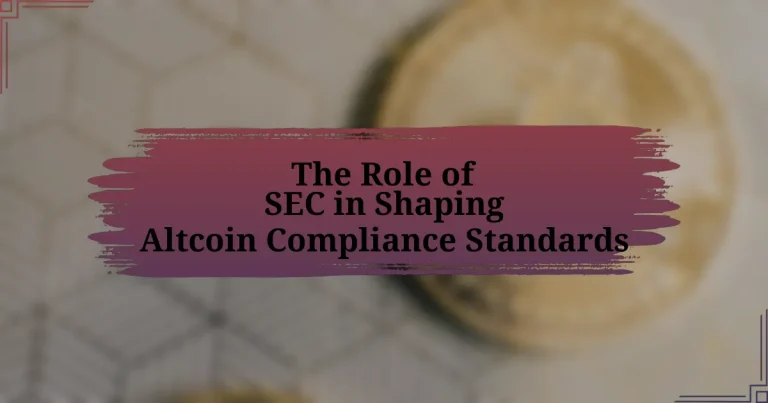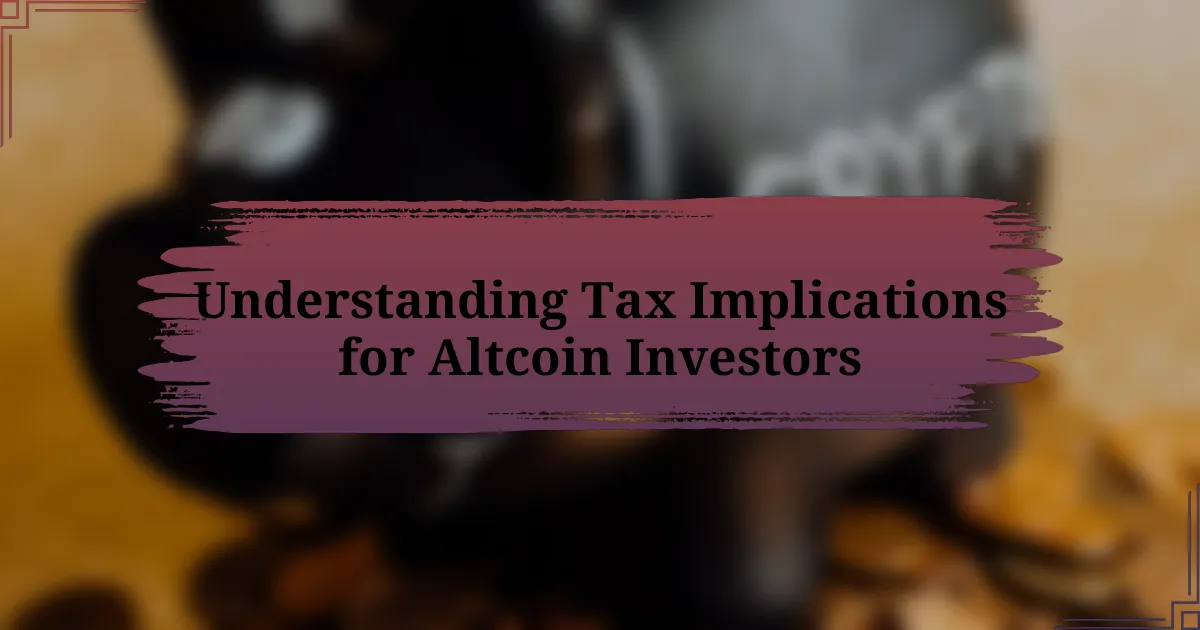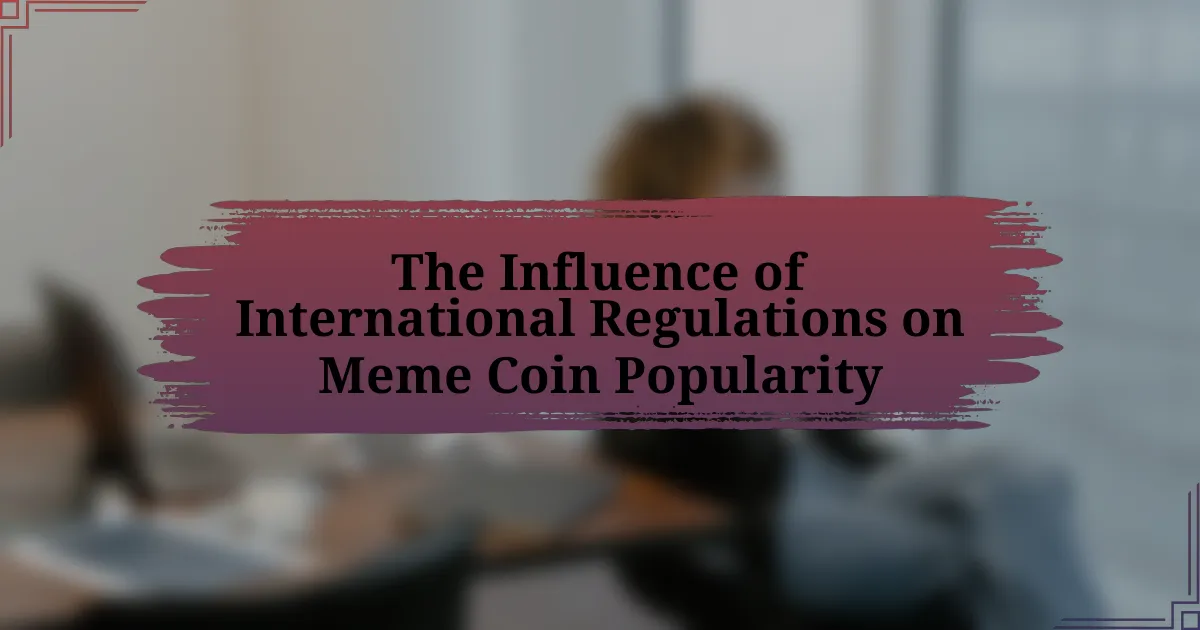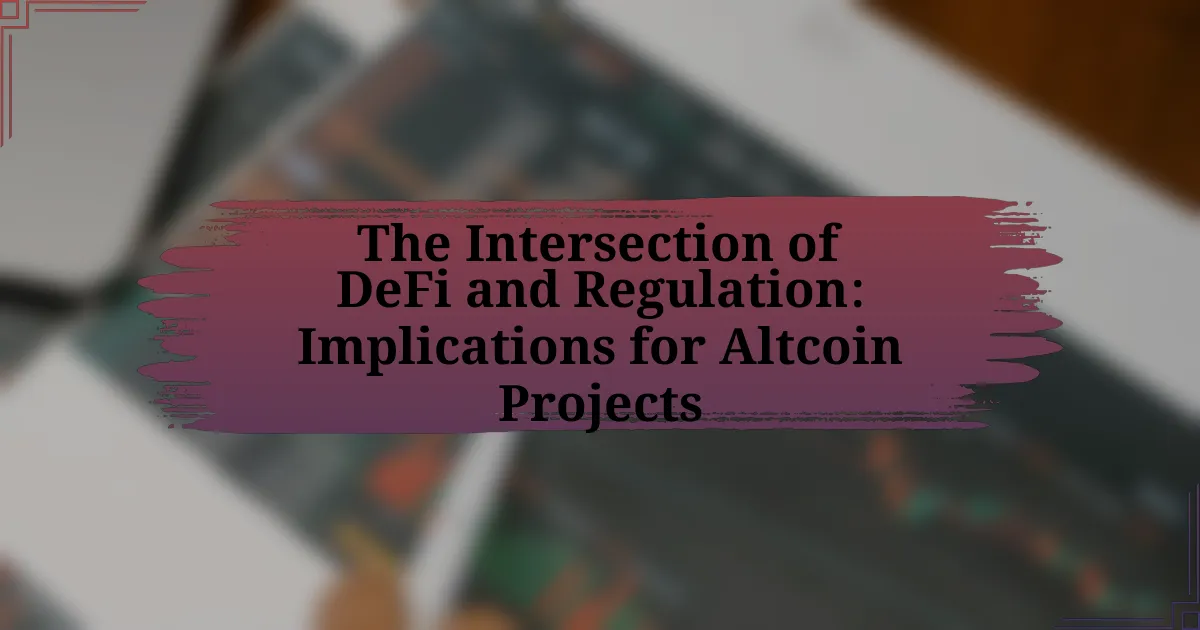The main entity in the article is the Securities and Exchange Commission (SEC) and its role in establishing compliance standards for altcoins. The article outlines how the SEC evaluates altcoins under U.S. law, primarily using the Howey Test to determine if they qualify as securities. It discusses the implications of these classifications on regulatory oversight, the importance of compliance for altcoin legitimacy, and the risks faced by non-compliant projects. Additionally, the article highlights the SEC’s evolving approach to altcoin regulation, recent changes in compliance standards, and best practices for altcoin developers to ensure adherence to SEC guidelines.

What is the SEC’s role in shaping altcoin compliance standards?
The SEC’s role in shaping altcoin compliance standards involves establishing regulatory frameworks that determine whether specific altcoins qualify as securities under U.S. law. The SEC evaluates altcoins based on the Howey Test, which assesses whether an investment involves an expectation of profits derived from the efforts of others. This evaluation has led to enforcement actions against various altcoin projects that failed to comply with securities regulations, thereby influencing the compliance landscape for altcoins. For instance, the SEC’s actions against Ripple Labs in 2020 highlighted the need for clarity in compliance standards, prompting many altcoin developers to reassess their regulatory obligations.
How does the SEC define altcoins in the context of compliance?
The SEC defines altcoins as cryptocurrencies other than Bitcoin that may be classified as securities under U.S. law, depending on their characteristics and the context of their sale. This classification is primarily based on the Howey Test, which assesses whether an investment contract exists, focusing on the expectation of profits derived from the efforts of others. The SEC has indicated that many altcoins could meet this criterion, thus requiring compliance with federal securities laws, including registration and disclosure obligations. This interpretation is supported by various enforcement actions and guidance issued by the SEC, emphasizing the need for altcoin issuers to ensure compliance to protect investors and maintain market integrity.
What criteria does the SEC use to classify altcoins?
The SEC classifies altcoins primarily based on the Howey Test, which determines whether an asset qualifies as a security. The criteria include the presence of an investment of money, a common enterprise, the expectation of profits, and efforts of others to generate those profits. This framework is rooted in the SEC’s mandate to protect investors and ensure fair markets, as established in the Securities Act of 1933. The application of the Howey Test has led to various altcoins being classified as securities, subjecting them to regulatory requirements.
How do these classifications impact regulatory oversight?
Classifications of altcoins significantly impact regulatory oversight by determining the applicable legal framework and compliance requirements. For instance, the SEC classifies cryptocurrencies as either securities or commodities, which influences the level of scrutiny and regulatory obligations imposed on issuers and exchanges. When an altcoin is classified as a security, it must adhere to stringent regulations under the Securities Act of 1933, including registration and disclosure requirements, thereby increasing oversight. Conversely, if classified as a commodity, it may fall under the jurisdiction of the Commodity Futures Trading Commission (CFTC), which has different regulatory standards. This classification system directly shapes how regulatory bodies monitor market activities, enforce compliance, and protect investors, as evidenced by the SEC’s actions against unregistered securities offerings in the altcoin space.
Why is compliance important for altcoins?
Compliance is important for altcoins because it ensures adherence to regulatory standards, which can enhance legitimacy and investor confidence. Regulatory bodies, such as the SEC, impose compliance requirements to prevent fraud and protect investors, thereby fostering a safer trading environment. For instance, altcoins that comply with regulations are more likely to gain acceptance from institutional investors, as seen in the increased participation of traditional financial institutions in compliant cryptocurrency projects. This compliance can also mitigate legal risks, as non-compliance can lead to penalties or bans, exemplified by the SEC’s actions against various non-compliant altcoins in the past.
What risks do non-compliant altcoins face?
Non-compliant altcoins face significant regulatory risks, including potential legal action from authorities like the SEC. These altcoins may be classified as unregistered securities, leading to fines, trading bans, or forced delisting from exchanges. For instance, in 2021, the SEC initiated enforcement actions against several altcoins for failing to comply with securities regulations, highlighting the consequences of non-compliance. Additionally, non-compliant altcoins may experience decreased investor confidence and market liquidity, as investors often prefer compliant assets to mitigate risks associated with regulatory scrutiny.
How does compliance affect investor confidence in altcoins?
Compliance significantly enhances investor confidence in altcoins by ensuring regulatory adherence and reducing perceived risks. When altcoins comply with established regulations, such as those set forth by the SEC, they demonstrate legitimacy and transparency, which are critical factors for investors. For instance, a study by the Cambridge Centre for Alternative Finance found that regulatory compliance can lead to increased institutional investment in cryptocurrencies, as it mitigates concerns about fraud and market manipulation. This correlation indicates that as altcoins align with compliance standards, they are more likely to attract a broader base of investors, thereby boosting overall market confidence.
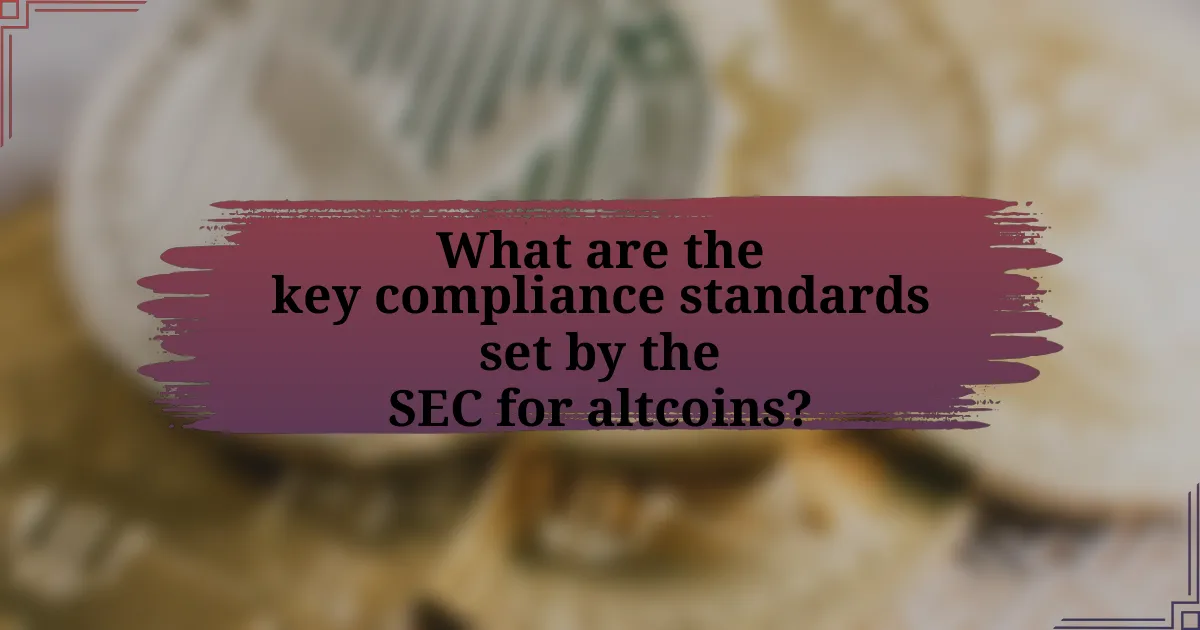
What are the key compliance standards set by the SEC for altcoins?
The key compliance standards set by the SEC for altcoins primarily revolve around the classification of these digital assets as securities. The SEC requires that altcoins meet the criteria established by the Howey Test, which determines whether an asset is considered a security based on the expectation of profits derived from the efforts of others. Additionally, altcoin issuers must comply with registration requirements unless a valid exemption applies, ensuring transparency and investor protection. The SEC also emphasizes the importance of anti-fraud provisions, mandating that all communications regarding altcoins must not be misleading or deceptive. These standards are enforced to maintain market integrity and protect investors in the rapidly evolving cryptocurrency landscape.
What regulations must altcoins adhere to under SEC guidelines?
Altcoins must adhere to the Securities and Exchange Commission (SEC) guidelines that classify them as securities under the Howey Test. This test determines whether an asset qualifies as an investment contract based on the expectation of profits derived from the efforts of others. If an altcoin meets these criteria, it must comply with registration requirements, including filing Form S-1, providing disclosures, and adhering to anti-fraud provisions as outlined in the Securities Act of 1933. Additionally, altcoins must follow ongoing reporting obligations under the Securities Exchange Act of 1934 if they are deemed securities, which includes regular financial disclosures and compliance with insider trading regulations.
How do these regulations differ from those for traditional securities?
Regulations for altcoins differ from those for traditional securities primarily in their classification and the criteria used for compliance. While traditional securities are typically classified under the Securities Act of 1933 and the Securities Exchange Act of 1934, altcoins often fall under the purview of the Howey Test, which assesses whether an asset is a security based on the expectation of profits derived from the efforts of others. This distinction leads to varying regulatory requirements; for instance, altcoins may not require the same level of disclosure and registration as traditional securities, which are subject to stringent reporting obligations. Additionally, the SEC has adopted a more flexible approach to altcoins, recognizing their unique characteristics and the evolving nature of blockchain technology, which contrasts with the more rigid framework applied to traditional securities.
What are the reporting requirements for altcoin issuers?
Altcoin issuers are required to comply with the reporting standards set by the Securities and Exchange Commission (SEC) if their offerings are classified as securities. This includes filing registration statements, periodic reports, and disclosures that provide transparency to investors. Specifically, altcoin issuers must submit Form S-1 for registration, Form 10-K for annual reports, and Form 8-K for significant events, as mandated by the Securities Act of 1933 and the Securities Exchange Act of 1934. These requirements ensure that investors receive essential information regarding the financial health and operational status of the altcoin projects, thereby promoting market integrity and investor protection.
How does the SEC enforce compliance among altcoins?
The SEC enforces compliance among altcoins primarily through regulatory frameworks that classify certain cryptocurrencies as securities. This classification mandates that altcoin issuers must register with the SEC and adhere to securities laws, which include disclosure requirements and anti-fraud provisions. The SEC has taken action against various altcoin projects for failing to comply with these regulations, exemplified by cases such as the enforcement actions against Ripple Labs for its XRP token, which the SEC deemed a security. These actions serve to establish legal precedents and encourage compliance within the altcoin market, reinforcing the SEC’s role in shaping compliance standards.
What mechanisms does the SEC use to monitor altcoin activities?
The SEC employs several mechanisms to monitor altcoin activities, including surveillance systems, regulatory frameworks, and enforcement actions. Surveillance systems analyze trading patterns and market behavior to detect potential fraud or manipulation. Regulatory frameworks, such as the Howey Test, help determine whether a digital asset qualifies as a security, guiding compliance requirements for altcoins. Enforcement actions involve investigations and penalties against entities that violate securities laws, ensuring accountability in the altcoin market. These mechanisms collectively enhance the SEC’s oversight and promote compliance within the altcoin ecosystem.
What penalties can be imposed for non-compliance?
Penalties for non-compliance with SEC regulations regarding altcoins can include fines, sanctions, and legal actions. The SEC has the authority to impose civil penalties that can reach up to $1 million per violation or three times the amount of the profit gained from the violation, whichever is greater. Additionally, non-compliant entities may face criminal charges, which can result in imprisonment for individuals involved, as well as the potential for the SEC to seek injunctive relief to prevent further violations. These measures are designed to enforce compliance and protect investors in the cryptocurrency market.

How does the SEC’s approach to altcoin compliance evolve over time?
The SEC’s approach to altcoin compliance has evolved from a largely reactive stance to a more proactive regulatory framework. Initially, the SEC focused on enforcement actions against specific altcoins, primarily assessing whether they qualified as securities under the Howey Test. Over time, the SEC has increased its engagement with the cryptocurrency community, issuing guidance and establishing frameworks for compliance, such as the Framework for “Investment Contract” Analysis of Digital Assets released in 2019. This shift reflects a recognition of the need for clearer regulatory standards, as evidenced by ongoing discussions about potential legislation and the establishment of a dedicated cryptocurrency unit within the SEC.
What recent changes have been made to altcoin compliance standards?
Recent changes to altcoin compliance standards include the increased scrutiny and regulatory clarity provided by the SEC, particularly regarding the classification of altcoins as securities. The SEC has intensified its enforcement actions against projects that fail to register their tokens, emphasizing the need for compliance with existing securities laws. This shift aims to protect investors and ensure that altcoin offerings meet regulatory requirements, as evidenced by the SEC’s actions against several high-profile projects in 2023, which highlighted the necessity for clearer guidelines and adherence to compliance protocols.
How do market trends influence SEC regulations on altcoins?
Market trends significantly influence SEC regulations on altcoins by prompting the agency to adapt its oversight based on the evolving landscape of cryptocurrency investments. As altcoin popularity and trading volumes fluctuate, the SEC assesses the associated risks and investor protections needed, leading to regulatory adjustments. For instance, during periods of rapid altcoin growth, the SEC has increased scrutiny on initial coin offerings (ICOs) and trading practices to prevent fraud and ensure compliance with securities laws, as seen in the 2017 ICO boom. This responsiveness to market dynamics ensures that regulations remain relevant and effective in safeguarding investors while fostering innovation in the cryptocurrency space.
What role do public comments and feedback play in shaping these standards?
Public comments and feedback are crucial in shaping altcoin compliance standards as they provide insights from various stakeholders, including investors, developers, and legal experts. This input helps regulatory bodies like the SEC understand the practical implications of proposed standards and identify potential issues or concerns that may not have been considered. For instance, during the SEC’s rulemaking process, public comments can lead to revisions that enhance clarity and effectiveness, ensuring that the standards are both enforceable and aligned with market realities. Historical examples, such as the SEC’s consideration of public feedback during the development of the Regulation Crowdfunding framework, demonstrate how stakeholder input can directly influence regulatory outcomes.
What challenges does the SEC face in regulating altcoins?
The SEC faces significant challenges in regulating altcoins due to their diverse nature and the rapid pace of technological innovation in the cryptocurrency space. The lack of clear regulatory definitions for what constitutes a security complicates the SEC’s ability to enforce compliance, as many altcoins do not fit neatly into existing legal frameworks. Additionally, the decentralized nature of many altcoins makes it difficult for the SEC to identify responsible parties for enforcement actions. The SEC also struggles with jurisdictional issues, as altcoins can be traded globally, often outside of U.S. regulatory reach. Furthermore, the evolving market dynamics and the introduction of new altcoins frequently outpace the SEC’s regulatory responses, creating gaps in oversight. These factors collectively hinder the SEC’s effectiveness in establishing comprehensive compliance standards for altcoins.
How does the decentralized nature of altcoins complicate compliance efforts?
The decentralized nature of altcoins complicates compliance efforts by creating challenges in identifying responsible parties for regulatory adherence. Unlike centralized entities, decentralized networks lack a single point of control, making it difficult for regulators to enforce compliance with laws such as anti-money laundering (AML) and know your customer (KYC) requirements. For instance, in 2021, the Financial Action Task Force (FATF) highlighted that the anonymity and lack of centralized governance in decentralized finance (DeFi) platforms hinder effective monitoring and enforcement of compliance measures. This decentralized structure leads to ambiguity in accountability, as transactions can occur without a clear traceable entity, complicating the ability of regulatory bodies like the SEC to impose standards and ensure adherence.
What are the implications of international regulations on SEC standards?
International regulations significantly influence SEC standards by necessitating alignment with global compliance frameworks. This alignment ensures that U.S. securities regulations remain competitive and relevant in a global market, particularly as financial markets become increasingly interconnected. For instance, the Financial Action Task Force (FATF) guidelines on anti-money laundering and counter-terrorism financing have prompted the SEC to enhance its regulatory measures to address risks associated with cryptocurrencies and altcoins. Consequently, the SEC may adopt stricter disclosure requirements and compliance protocols to meet international standards, thereby fostering investor protection and market integrity.
What best practices should altcoin projects follow to ensure compliance?
Altcoin projects should implement comprehensive regulatory frameworks to ensure compliance with existing laws. This includes conducting thorough legal assessments to determine whether their tokens qualify as securities under the Howey Test, which evaluates investment contracts based on the expectation of profits derived from the efforts of others. Additionally, altcoin projects should establish robust Know Your Customer (KYC) and Anti-Money Laundering (AML) procedures to prevent illicit activities and enhance transparency.
Furthermore, maintaining clear communication with regulatory bodies, such as the SEC, is crucial for staying updated on evolving regulations. Regular audits and compliance checks can help identify potential issues early, ensuring adherence to legal standards. By following these best practices, altcoin projects can mitigate legal risks and foster trust among investors and regulators alike.
How can altcoin developers stay informed about SEC regulations?
Altcoin developers can stay informed about SEC regulations by regularly monitoring the SEC’s official website and subscribing to their updates. The SEC publishes guidelines, enforcement actions, and regulatory changes that directly impact the cryptocurrency market. Additionally, developers can follow industry news outlets and legal analysis platforms that cover SEC activities related to digital assets. Engaging with professional networks and attending industry conferences can also provide insights into regulatory trends and best practices.
What resources are available for altcoin projects to achieve compliance?
Altcoin projects can utilize legal firms specializing in cryptocurrency regulations, compliance software solutions, and industry associations to achieve compliance. Legal firms such as Perkins Coie and Cooley LLP provide guidance on navigating SEC regulations and other legal requirements. Compliance software like Coinfirm and Chainalysis helps projects monitor transactions and ensure adherence to anti-money laundering (AML) and know your customer (KYC) regulations. Additionally, industry associations like the Blockchain Association offer resources, advocacy, and best practices for compliance with evolving regulatory standards. These resources collectively support altcoin projects in aligning with SEC guidelines and maintaining regulatory compliance.

